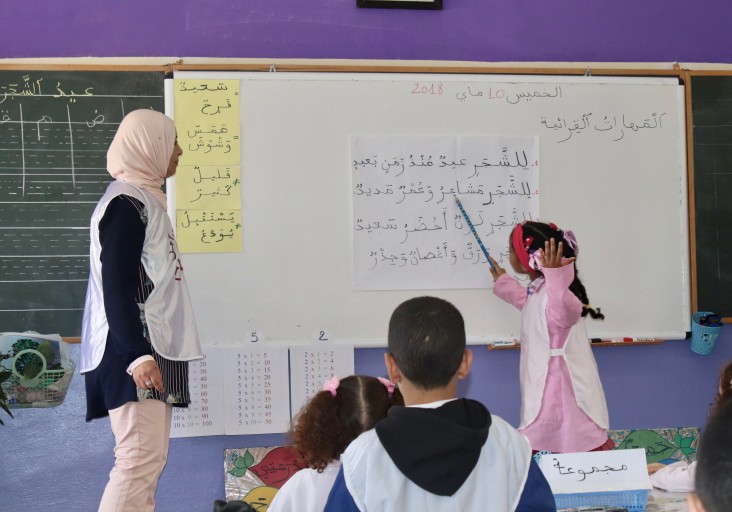Speeches Shim

Ms. Naima Benour is a Grade 3 teacher at Riyad primary school in Kenitra, a city on the Atlantic coast in the north of Morocco, and part of Rabat-Salé-Kénitra, one of the beneficiary regions of USAID’s Reading for Success project. Ms. Benour has been a teacher for over 30 years.
“I have recently been thinking if I will spend the start of this decade the same way that I spent the start of the last: wondering how to improve the teaching-learning process. I could no longer continue to teach reading the way I did, relying on memorization and repetition,” says Ms. Benour. “My students continued to show little progress in reading and struggled in the higher grades. I felt as tired, helpless, frustrated and demotivated as my students. But fortunately, this has been a momentous decade in the long life of my teaching career. It marked the arrival of USAID’s Reading for Success project at my school!”
"I am glad I witnessed this new reading instruction approach before my retirement. This project has redefined what it means to teach reading to early grade students. I hope no primary school teacher in Morocco will be left out of this amazing learning opportunity!"
-Ms. Naima Benour, Grade 3 teacher
Ms. Benour observed that a few months after the introduction of the USAID reading program she quickly understood why her students could not learn using her traditional teaching methods. “I simply did not teach them the way they learn at their age,” she noted. “USAID’s phonics-based approach of reading instruction has opened my eyes to their basic learning needs. Instead of imposing word recognition on them like I used to do, they first need to learn to read and spell using phonics and understand the relationship between letters and sounds.”
“Children love to play, and they need to have fun while learning,” she added. “This project not only provided me with the tools and knowledge to support this new reading approach, but it also helped me improve and diversify my teaching style. The learning games, the team-building activities, storytelling, and songs have transformed my students’ learning behavior. My classroom takes on a new air of excitement and joy of learning and teaching. I owe it all to this project!”
Mr. El Hossine Ben Hassina is among the new generation of primary school teachers. He is also a Grade 3 teacher at Ibn Batouta, a rural primary school in Tiznit, a small town in the southern Moroccan region of Souss-Massa where USAID is implementing its reading project. In a classroom where students have never used the internet, Mr. Ben Hassina has found a way to bring an interactive whiteboard to his classroom using Wii Remote, which uses an infrared pen as a mouse, and a projector. His students have fun manipulating images and data on the interactive whiteboard’s wide screen while engaging in vocabulary exercise activities. Mr. Ben Hassina transformed his classroom into a vibrant and dynamic learning environment.
“USAID’s innovative reading project has inspired me to be creative and explore all possible ways to engage my students and improve their learning,” notes Mr. Ben Hassina. “I was a good student in science and math, which has helped me integrate technology using my own methods.”
"I have begun to like my job better. This project has been a source of optimism and creativity. It has unlocked my full potential. I am not what a primary teacher traditionally is. I am a mentor, a facilitator, an actor, a learner and an IT person too! You can see that my students and I have no time to get bored!"
-Mr. El Hossine Ben Hassina, Grade 3 teacher
“Since the start of this project, I am amazed to watch my students learn and grow. This has encouraged me to invest more and more in their education and find ways to create everlasting learning experiences.
“I have reaped the benefits: teaching has never been so interesting and my students have never been so attentive, motivated and eager to demonstrate creativity. They are usually late for the next class. When the bell rings, it is just hard to get them out of the classroom!”
New and experienced teachers agree that USAID’s support and collaboration with the Ministry of Education on the Reading for Success program is contributing to improved learning outcomes across Morocco.
Having trained more than 20,000 primary school educators and reached more than 650,000 primary school students, the Reading for Success program is better preparing these students for future success.

Comment
Make a general inquiry or suggest an improvement.